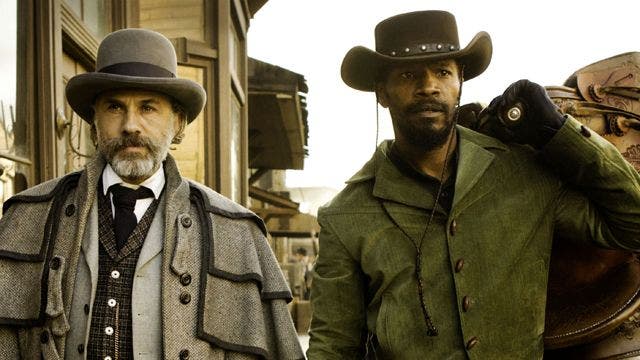I think it’s probably fair to say that most
fans won’t be disappointed. This is 70% spaghetti western, 15% history lesson,
10% comic book, 5% hip hop. Exactly. However, it is also a movie, and a subject
matter, that has been given the Hollywood treatment. Which means there are no
great surprises (actually I am struggling to recall any), the pressure never
lets up, and it is very glossy (OK so they gave some very pretty actors bad teeth
but I think a historian might have something to say about almost everything
else). And of course, it has caused plenty of controversy.
If anyone else were to attempt a film about
slavery it would be a serious drama. Painful, gritty, challenging, probably
unwatchable. Although Tarantino doesn’t shy away from some of the realities of the
subject matter, and there are some truly gruesome scenes which I won’t ever
forget, there is a certain detachment from the true pain of it – a Tarantino
sheen - and consequently the really hard questions aren’t ever quite asked. As
you would expect there’s a lot of violence, but it barely touches on the
emotional or psychological trauma. Perhaps this is because the world in which
Django’s story takes place is hugely stylised, and that exaggeration removes the
final bite of reality.
As a piece of film making this movie is
immense in almost every imaginable sense. The characters border on caricatures
– for example Leo plays ‘Monsieur Candie’ the proprietor of Candyland, complete
with eccentric outfit, long cigarette and a mad glint in his eye – it’s almost
the evil Mad Hatter. All the leads pull it off – Christoph Waltz in particular
stood out for me – and the exaggerated characterisation fits the style of the
film. However, their two dimensional depiction means you never achieve a real
engagement with them, you don’t get inside their heads. The most affecting and
memorable moments are the horrible acts of violence against minor characters
and not our heroes story. Consequently the brutal world which they inhabit is always
kept at arms’ length, and the unbearable is made watchable. To me, that rings a
little of cheating.
The soundtrack is huge. It’s in your face,
overbearing and very entertaining - a mash up of traditional Western riffs and
a bit of hip hop (used cleverly at times – unless I’m reading too deep, it acknowledges
social changes and contemporary cultural interpretations which are not spoken
in the script). The production design is also remarkable - the sheer intensity
of colour throughout is impressive and I think I can remember every costume, when
does that happen? This all adds enormously to the sense of drama and recalling
the film now (at 3am and maybe 10 hours and several glasses of wine after I saw
it), it feels like stepping back into the madhouse. That’s not the wine talking
- this film is just so....BIG. And I can’t remember the cinema feeling like
that for some time.
That isn’t to say there isn’t a serious
side to the movie and some of the best moments for me are when Tarantino
challenges the audience; using the characters to lead you to a point where you
suddenly realise you are uncomfortable; making you question what it’s OK to
laugh at; pointing out the indelible footprint of this era on contemporary
America...He is also adept at making characters that endorse the status quo appear
crushingly stupid, so blinded by their meaningless positions of power, almost
deranged in their condoning of slavery - although at times that makes them
comical, which again (inappropriately?) lifts the mood on a very, very heavy
subject matter. Perhaps one of the most interesting questions he asks of us is
in the role played by a barely recognisable Samuel L. Jackson, I don’t want to
give away too much, but his part in Django’s story touches on some challenging,
and timeless, human characteristics. Ultimately though, these issues are
acknowledged and not addressed - but then the spaghetti western is hardly known
for its delicacy in dealing with debates on human rights, the shadow of history
or the brutal truth of human nature...
I want to say that I really loved this
film, and on one level I did. As a piece of film making I think it is pretty
incredible – the cast are brilliant, the direction is spot on, it’s genuinely
laugh out loud funny, it is truly an ‘experience’. Whether this is an
acceptable way in which to make a film about slavery, well, that’s an entirely
different question - one which is sparking a lot of debate – and as the power
of the cinema experience fades it seems there are elements that I am
increasingly uneasy with. One thing I would say is that I think Quentin
Tarantino may be the only director out there who could have got away with it.


No comments:
Post a Comment